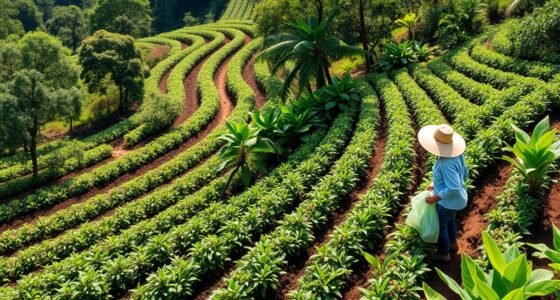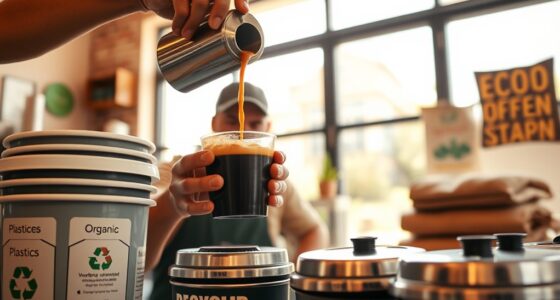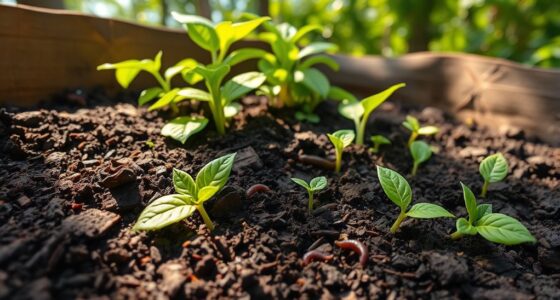Organic coffee standards guarantee you support environmentally friendly farming that avoids synthetic chemicals, promotes biodiversity, and uses practices like crop rotation and composting. Certification from bodies like USDA Organic confirms farmers meet strict sustainability criteria, though achieving certification can be costly and time-consuming. These standards help you trust that your coffee is produced sustainably and ethically, but they also involve trade-offs, such as higher prices and industry challenges. Keep exploring to understand how these standards shape your coffee choices.
Key Takeaways
- Organic coffee must meet strict standards set by certifying bodies like USDA Organic or EU Organic.
- Certification ensures no synthetic fertilizers or pesticides are used, promoting environmental sustainability.
- The process can be costly and time-consuming, especially for smallholder farmers.
- Certified organic coffee supports biodiversity, soil health, and eco-friendly farming practices.
- Consumers can trust that organic labels reflect genuine adherence to environmental and social standards.

Organic coffee has gained popularity among coffee enthusiasts who value health and sustainability. When you choose organic, you’re supporting farming methods that prioritize environmental health and the well-being of farmers. But what truly sets organic coffee apart are the sustainability practices and certification processes that ensure these standards are met. These practices involve more than just avoiding synthetic chemicals; they encompass a holistic approach to cultivating coffee that minimizes ecological impact. Farmers often employ crop rotation, composting, and natural pest control to maintain soil health and reduce pollution. By doing so, they help preserve biodiversity and prevent soil degradation, making organic coffee a more sustainable choice compared to conventional options.
Organic coffee supports eco-friendly farming with sustainable practices like crop rotation and natural pest control.
The certification process plays a crucial role in guaranteeing that the coffee you buy truly adheres to organic standards. It involves rigorous inspections and documentation to verify that farmers follow strict guidelines set by certifying bodies like USDA Organic or EU Organic. During these inspections, auditors review farming practices, inputs used, and record-keeping to ensure compliance. This process not only confirms that no synthetic fertilizers or pesticides are involved but also assesses the broader sustainability practices employed on the farm. Certification provides you with confidence that the coffee you purchase genuinely supports environmentally friendly farming methods. It also encourages farmers to maintain transparency and invest in sustainable practices, knowing they can earn recognition and access to niche markets. Additionally, the certification process helps to promote transparency in labeling and builds trust among consumers.
However, the certification process isn’t without its challenges. It can be costly and time-consuming, especially for smallholder farmers who may lack the resources to navigate complex paperwork and inspection procedures. Sometimes, farms might face difficulties in meeting all the requirements, leading to delays or even loss of certification. Despite these hurdles, the process remains essential for maintaining trust and integrity in the organic coffee industry. It ensures that the standards of sustainability practices are upheld and that consumers like you can make informed choices. As more farmers pursue certification, the industry continues to evolve, emphasizing eco-friendly cultivation methods and fair treatment of workers.
Choosing organic coffee means you’re not only enjoying a product with fewer chemicals but also supporting farming practices that respect the environment and promote sustainability. The certification process acts as a safeguard, ensuring that these practices are genuine and consistent. While it may involve some trade-offs, such as higher prices or stricter regulations, the benefits—healthier farms, cleaner ecosystems, and a more sustainable coffee supply—are well worth it. By understanding these standards and processes, you become a more conscious consumer, helping to drive positive change in the coffee industry.
Frequently Asked Questions
How Does Organic Certification Impact Coffee Pricing?
Organic certification increases your coffee pricing through a price premium, reflecting higher quality and sustainable practices. You’ll also face certification costs, which can add to expenses upfront. These costs are often passed on to consumers, making your organic coffee more expensive. While the certification boosts your product’s value, it’s essential to balance these costs with the benefits of appealing to eco-conscious buyers willing to pay a premium for organic options.
Are Organic Coffees More Environmentally Sustainable Overall?
Think of organic coffee as a gentle river carving a sustainable path through the landscape. It’s more environmentally sustainable overall because it promotes wildlife conservation and reduces water usage, helping ecosystems thrive rather than drain them. By avoiding synthetic chemicals, organic farming nurtures soil health, supports biodiversity, and conserves water resources. So, choosing organic coffee means you’re helping protect nature’s delicate balance, much like guiding a river toward a greener, healthier future.
What Are Common Misconceptions About Organic Coffee Standards?
You might believe that organic coffee standards guarantee perfect quality, but certification myths exist—labels aren’t always completely accurate. Some assume all organic coffees are equally sustainable or free from pesticides, yet label accuracy varies, and standards can be loosely enforced. Don’t rely solely on the label; research the producer’s practices and certification details to truly understand the coffee’s transparency and environmental impact.
How Do Trade-Offs Affect Coffee Flavor and Quality?
Trade-offs can impact your coffee’s flavor and quality by causing flavor compromise or quality trade-offs. When farmers prioritize organic standards, they might use fewer synthetic inputs, which can sometimes lead to subtle changes in taste, like less consistency or brightness. While these trade-offs aim for better sustainability, they can sometimes mean sacrificing certain flavor nuances or overall quality. So, balancing standards and quality remains essential for a satisfying coffee experience.
Can Organic Coffee Be Fully Traceable From Farm to Cup?
Yes, organic coffee can be fully traceable from farm to cup. You can follow farm traceability through certification records, farm audits, and supply chain documentation. However, certification challenges like inconsistent record-keeping or complex supply chains might make it difficult. By prioritizing transparent practices and working with certified producers, you guarantee the organic integrity and traceability of your coffee, giving you confidence in its quality and origin.
Conclusion
Choosing organic coffee supports sustainable farming and better health, but it comes with trade-offs like higher costs. Did you know that organic coffee sales have increased by over 10% annually in recent years? By opting for organic, you’re not only enjoying a richer, more authentic flavor, but you’re also contributing to environmental conservation. So, next time you brew your cup, remember you’re making a positive impact—one sip at a time.









